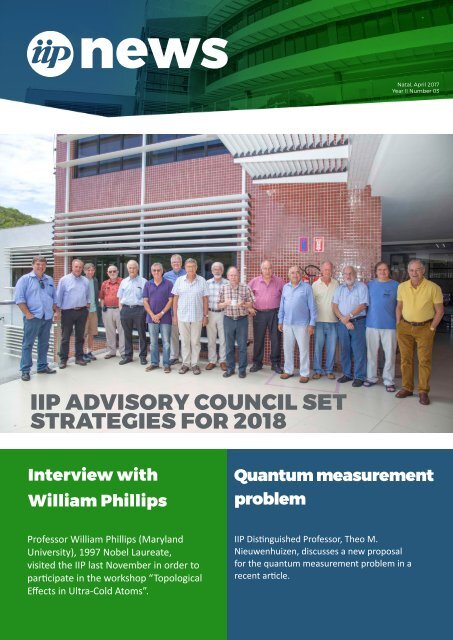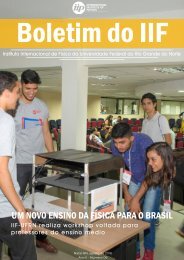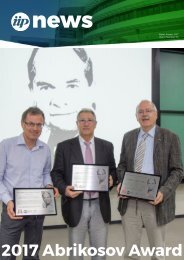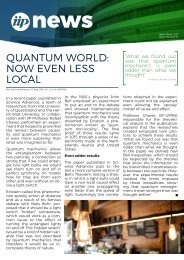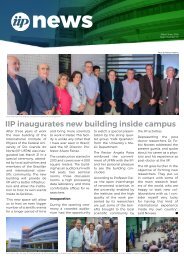IIP News 03
The IIP is a research institute with an international vocation, permanently facing the frontier areas of theoretical physics. Its mission is to intensify the exchange of scientific knowledge with the international community and, in particular with the Latin American community, being a pole unifying national strategic areas of theoretical physics.
The IIP is a research institute with an international vocation, permanently facing the frontier areas of theoretical physics. Its mission is to intensify the exchange of scientific knowledge with the international community and, in particular with the Latin American community, being a pole unifying national strategic areas of theoretical physics.
You also want an ePaper? Increase the reach of your titles
YUMPU automatically turns print PDFs into web optimized ePapers that Google loves.
news<br />
INTERNATIONAL<br />
INSTITUTE OF<br />
PHYSICS<br />
Natal,<br />
April 2017<br />
Year II Number <strong>03</strong><br />
<strong>IIP</strong> ADVISORY COUNCIL SET<br />
STRATEGIES FOR 2018<br />
Interview with<br />
William Phillips<br />
Quantum measurement<br />
problem<br />
Professor William Phillips (Maryland<br />
University), 1997 Nobel Laureate,<br />
visited the <strong>IIP</strong> last November in order to<br />
participate in the workshop “Topological<br />
Effects in Ultra-Cold Atoms”.<br />
<strong>IIP</strong> Distinguished Professor, Theo M.<br />
Nieuwenhuizen, discusses a new proposal<br />
for the quantum measurement problem in a<br />
recent article.
2<br />
On the last 20 and 21ft of March the International<br />
Advisory Council (IAC) of the <strong>IIP</strong> gathered to discuss<br />
the results achieved by the <strong>IIP</strong> in 2016, as well<br />
as the new directives for the Institute for 2018.<br />
The IAC is formed by renowned physicists from<br />
different research institutions around the world.<br />
The council meets once a year to select the new<br />
academic programs, to discuss new academic hiring’s<br />
and to review the past activities and results.<br />
According to the <strong>IIP</strong> director, Professor Alvaro Ferraz,<br />
the meeting presented some of the challenges<br />
that the <strong>IIP</strong> must overcome next year, but also<br />
brought up the positive outcomes of the performance<br />
made by the Institute in 2016, specially after<br />
the inauguration of the new building inside the<br />
UFRN campus.<br />
<strong>IIP</strong> <strong>News</strong> - Year II, number <strong>03</strong><br />
<strong>IIP</strong> Advisory Council set strategies for 2018<br />
“In the last year we saw a great deal of goals been<br />
achieved here at the <strong>IIP</strong>. Our building inauguration<br />
allowed us to have longer events and opened the<br />
possibility for us to receive a larger number of visiting<br />
researchers, in spite the fact that we are still<br />
learning how to make better use of our building.<br />
We are very confident in fulfilling the IAC expectations<br />
for the next year by achieving even better<br />
results.”<br />
Part of the international events for 2018 is already<br />
approved. Some other propositions are still to be<br />
approved by the members of the council and may<br />
still be added to the official program of events<br />
in the next few weeks. The final list will be announced<br />
in the <strong>IIP</strong> website (www.iip.ufrn.br), as<br />
soon as possible.<br />
IAC members discuss goals for the <strong>IIP</strong> in 2018<br />
<strong>IIP</strong> Professor selected to represent Brazil in SBF –<br />
APS collaboration<br />
The newest member of the <strong>IIP</strong><br />
academic staff, Professor Riccardo<br />
Sturani, will present a series<br />
of lectures in the USA as part<br />
of an exchange initiative, jointly<br />
lead by the Brazilian Physics<br />
Society (SBF) and the American<br />
Physics Society (APS). This program<br />
will allow students and researchers<br />
from both countries<br />
to visit universities overseas<br />
in order to learn more about<br />
each other’s research and share<br />
teaching experience.<br />
Professor Sturani will represent<br />
Brazil with a mini-course<br />
on Post Newtonian Approximation<br />
to General Relativity.<br />
The course will be delivered at<br />
the Massachusetts Institute of<br />
Technology (MIT).<br />
Professor Sturani was the only<br />
one selected among the researchers<br />
registered to participate<br />
in the program. Five students<br />
from different Brazilian<br />
institutions were also selected<br />
to attend a series of courses in<br />
the USA.<br />
Professor Riccardo Sturani<br />
“I am already a part of a collaboration<br />
in the USA through the<br />
LIGO initiative, and my 8-hour<br />
course will focus on some of the<br />
results obtained by the experiment.<br />
I expect to arrive at MIT<br />
by the end of June”, said Professor<br />
Sturani.
April, 2017 3<br />
Interview with Prof. William Philips<br />
One of the most preeminent physicists in the field of cold atoms, Professor William Phillips<br />
(Maryland University) visited the <strong>IIP</strong> last November in order to participate in the workshop<br />
“Topological Effects in Ultra-Cold Atoms” as one of the invited speakers. During his stay at the<br />
Institute Professor Phillips, a 1997 Nobel Physics Laureate, talked with the <strong>IIP</strong> news about his work,<br />
pranks in the scientific community and faith.<br />
<strong>IIP</strong> - How has been your experience in this workshop<br />
in Natal?<br />
PROFESSOR WILLIAM PHILLIPS - Well, I’ve learned<br />
a lot. This is a workshop about something that I am<br />
really interested in, ultracold atoms and topological<br />
features in ultracold atoms. Those are really hot topic<br />
and I’ve been learning a lot.<br />
<strong>IIP</strong> - What was the most interesting so far?<br />
WP - Well, that’s hard to say. I tend to be interested in<br />
all kinds of thing, so it would be very difficult for me<br />
to identify any single thing as having been the most<br />
interesting. For example, the last talk that we had today<br />
was a theoretical talk about different regimes of<br />
response of a cold atom system to a kind of random<br />
process of excitation, something that’s been done<br />
strongly enough to produce turbulence and the richness<br />
of the Phenomena that can be seen was really<br />
intriguing to me.<br />
Earlier we had talks about realization in a cold atom<br />
system of an analog to magnetic poles, and that’s a<br />
very exciting idea because in nature no one has ever<br />
confirmed the existence of an isolated magnetic<br />
monopole of the sort of what you may think of a particle<br />
from which magnetic fields emanate, but in cold<br />
atom systems we can make something that looks very<br />
much like that, that has analog features and that’s<br />
very exciting to see those kinds of analogies in an cold<br />
atom system. I am just beginning to understand how<br />
that works, so that’s really exciting too, but each of<br />
the talks that I listened to is exciting in their own ways<br />
<strong>IIP</strong> - Where were you when you learned about your<br />
Nobel Prize and how did you feel at that moment?<br />
WP - I was attending a conference in California. My<br />
home is in the east cost of the USA, in Maryland and<br />
I was attending a conference in the west coast. I got<br />
a call in the middle of the night. I don’t remember<br />
exactly when, around 3:00 a.m., the point is that they<br />
make the decision or they announced the decision<br />
around noon in Stockholm. That’s around 06:00 a.m.<br />
in the east coast.<br />
The thing that was amazing about this was that they<br />
knew where I was. They (the Nobel Prize Committee)<br />
told me after informing me by telephone, that probably<br />
I wouldn’t get anymore sleep because the press<br />
would be after me, but the press had no idea of where<br />
I was, but they did.<br />
So the Nobel committee had made it their business to<br />
find out where I was going to be and they were able<br />
Photo by Juliano Lima Barreto<br />
Professor William Philips presents a lecture at the <strong>IIP</strong><br />
to call my room at <strong>03</strong>:00 am in order to find me and<br />
congratulate me.<br />
Another thing that was interesting about that was<br />
that there have been times when people have been<br />
tricked.<br />
Someone who thought they should win a Nobel Prize<br />
had someone call them up with a fake Swedish accent<br />
to tell them that they won a Nobel prize.<br />
I think that the Nobel committee understood that<br />
someone would be skeptical of getting a call in the<br />
middle of the night and so after the president of the<br />
Royal Academy, who was the one who called me and<br />
gave me his congratulations he put on the phone two<br />
other people who were members of the Academy and<br />
whom I knew personally to congratulate me (giggles).<br />
I think that part of the reason was to reassure me or,<br />
I am sure they did a similar thing to other people, to<br />
reassure me that this wasn’t a joke.<br />
<strong>IIP</strong> - What do you think were the most important developments<br />
in physics of cold atoms from 1997 until<br />
now?<br />
WP - I assume that you are taking 1997 as a point because<br />
that was when the Nobel Prize was awarded (to<br />
me). By that time it was just in the earliest days that<br />
people had demonstrated that you can make a Bose<br />
condensate. They were seeing some of the earliest<br />
properties of Bose condensates.<br />
My own group hadn’t yet made a Bose condensate.<br />
We got it shortly after I returned from Stockholm after<br />
the award of the Nobel Prize and then we all started<br />
doing all kind of stuff. They were different from what<br />
other people were doing because it was so new that
4<br />
everybody was doing something different and it was<br />
all new, and it was all different, and it was all exciting.<br />
In 1999 we were just doing the first experiments on<br />
Bragg scattering, so 1997 we hadn’t even developed<br />
the use of Bragg scattering as a tool for studying these<br />
things, so a few years later we in my laboratory did<br />
the first experiments on Bragg scattering and then<br />
people started doing that sort of thing in lots of other<br />
laboratories and now it has become a standard tool<br />
for learning about excitations in both condensates.<br />
But I have to mention Fermi gases. That was another<br />
huge thing. In 1997 the idea of making degenerated<br />
Fermi gases was still just a dream and if I think about<br />
degenerate Fermi gases I have to talk about Debbie<br />
Jim because she begun the quest for making a degenerated<br />
Fermi Gas. She worked on those first experiments<br />
for bonse condensation and then took off with<br />
her own research program to try to make a degenerate<br />
Fermi Gas.<br />
Now this is important because so much of our understanding<br />
of materials has to do with the nature of the<br />
electrons. So if we want to understand how electrons<br />
behave in materials one of the ways<br />
that we can do this is by looking at the<br />
way that fermionic atoms behave in a<br />
cold gas, and why do we want to do<br />
that? Because with cold atomic gases<br />
we have different things that we<br />
can measure and different ways that<br />
we can control the gas compared to<br />
what we can do in materials.<br />
That is why is so attractive to study<br />
cold atomic gases, because we have more control<br />
over them, or at least we can control them in different<br />
ways, and we can measure different things. Debbie Jin<br />
showed that under the right circumstances the fermions<br />
could pair, could produce cooper pairs, in the<br />
same way that electrons could pair in superconductors.<br />
This showed that you can change the scattering<br />
length, that is by changing the nature of the interactions<br />
between the fermions, she could go from having<br />
interactions that were attractive, that could produced<br />
cooper pairs and make something that was like a superconductor<br />
making repulsive interactions under<br />
which the atoms could form molecules.<br />
One of the reasons why I spend so much time talking<br />
about the things that Debbie Jin did was that just this<br />
past September, at the age of 47, Debbie died. And<br />
that was a tremendous loss to our field. I know that<br />
she will never be forgotten because of the physics<br />
that she did was so important that we will continue<br />
to use it, but I think it is important to say what a big<br />
impact she had and how sad we all are that she is not<br />
with us anymore.<br />
<strong>IIP</strong> - You are one of the founders of the International<br />
Society for Science and Religion. How did your involvement<br />
with that society begin?<br />
“That is why it is so attractive<br />
to study cold atomic gases,<br />
because we have more control<br />
over them, or at least we can<br />
control them in different ways”<br />
Professor William Phillips<br />
<strong>IIP</strong> <strong>News</strong> - Year II, number <strong>03</strong><br />
Source: JILA Scientific Communications<br />
Professor Deborah Jin (1968–2016)<br />
WP - I should tell you that being one of the founders<br />
of this society simply means that I was one of the<br />
original members. There were hundreds of people<br />
who were original members. It wasn’t as if I was like<br />
“Oh, wouldn’t it be great if we had an international<br />
society for science and religion?” Some other people<br />
did that and invited a number of<br />
people who had interest on these<br />
lines to be among the original members.<br />
And every so often additional<br />
members are elected to the international<br />
society.<br />
So, I have always been a person of<br />
faith. I never felt that there was any<br />
conflict between my religious faith<br />
and my understandings of science, and when I was<br />
invited to be part of this I was completely comfortable<br />
with the idea of a compatibility between science<br />
and religion. That’s the connection<br />
<strong>IIP</strong> - Have you been able to establish positive discussions<br />
on this subject, even in such a polarized society<br />
that we live today?<br />
WP - I give a number of lectures from time to time<br />
about the question of science and religion, in which<br />
mainly I claim that there isn’t a problem.<br />
I don’t know whether I have ever convinced anyone<br />
who was skeptical of the claims of religious faith, but<br />
they should give it a little bit more thought, but what<br />
I hope is that I have encouraged people to believe<br />
that there are people of religious faith to believe<br />
that scientists are not godless apostates and I hope<br />
that I have encouraged people who believe in science<br />
but do not believe in religious faith that people<br />
who do believe in religious faith are not simply superstitious<br />
fools.<br />
So I am not so much interested in trying to convert<br />
somebody to my way of thinking, but to try to encourage<br />
them to believe that people who think differently<br />
from them are not foolish.<br />
See the full enterview at www.iip.ufrn.br
April, 2017 5<br />
Quantum measurement problem:<br />
New approach suggested<br />
By Theo M. Nieuwenhuizen<br />
<strong>IIP</strong> Distinguished Professor<br />
Quantum mechanics is a probabilistic theory that does not describe<br />
individual events. Yet when we perform a single measurement,<br />
we find a well-defined outcome. This apparent contradiction,<br />
known as the measurement problem, has a long history<br />
going back to the early days of quantum mechanics. A research<br />
collaboration involving the Institute of Physics proposes a new<br />
approach to this problem.<br />
The work produced by an international collaboration, which<br />
consists of Armen Allahverdyan (Yerevan Physics Institute, Armenia), Roger Balian (CEA Saclay,<br />
France) and Theo Nieuwenhuizen (IoP Amsterdam and International Institute of Physics, Natal,<br />
Brazil) was published in January by the Annals of Physics. The researchers propose two main<br />
ingredients that are sufficient to account for all properties of quantum measurements, including<br />
the uniqueness of the outcome of each individual run.<br />
Relaxation of sub-ensembles<br />
Understanding the quantum measurement process requires describing the measured system<br />
and the measurement apparatus as a compound quantum system governed by the rules of<br />
quantum statistical mechanics. The dynamical process that this system undergoes appears to<br />
be a relaxation to thermodynamic equilibrium. The final state thus reached yields information<br />
about a large statistical ensemble of runs but does not describe individual runs of the measurement.<br />
The authors note that decompositions of this final state may generate states which<br />
are candidates to describe sub-ensembles of runs. Next, they employ a new mechanism called<br />
‘poly-microcanonical relaxation’ to prove that over a very short time scale all such states reach<br />
the form that agrees with the expected properties of ideal quantum measurements. This result<br />
is a step towards understanding individual runs, but it is still formal.<br />
Postulate at the macroscopic level<br />
The formalism of quantum mechanics assigns numbers called ‘q-probabilities’ to each possible<br />
outcome of an arbitrary measurement. Due to the specific features of quantum theory, this<br />
set of numbers cannot in general be interpreted as actual probabilities. However, the authors<br />
postulate such an interpretation for the specific q-probabilities pertaining to the indications<br />
of the pointer of the measurement device. The consistency of this interpretation relies on<br />
the macroscopic size of the pointer and on the properties of the final states associated with<br />
sub-ensembles. The new postulate relates quantum theory to observational facts but does not<br />
directly concern the tested microscopic system. It allows to describe properties of individual<br />
runs, and provides a justification to all properties usually attributed to ideal measurements.<br />
These results contribute to a deeper insight in the measurement problem.
6<br />
<strong>IIP</strong> <strong>News</strong> - Year II, number <strong>03</strong><br />
Month of special colloquia at the <strong>IIP</strong><br />
Professors Gerrardus ‘t Hooft, Giuseppe Mussardo and David R. Nelson during the special series of colloquiums<br />
During the month of March the<br />
<strong>IIP</strong> hosted a series of colloquia<br />
presented by world renowned<br />
physicists that are part of the Institute’s<br />
International Advisory<br />
Council. Professors David Nelson<br />
(Harvard University - USA), Gerardus<br />
‘t Hooft (Utrecht University<br />
- Netherlands) and Giuseppe<br />
Mussardo (SISSA – Italy) delivered<br />
special lectures for the local community.<br />
The colloquiums “Gene Surfing<br />
and Survival of the Luckiest”<br />
(Prof. Nelson); “Black Holes as<br />
Essential Ingredients of a Quantum<br />
Gravity Theory”(Prof. ‘t<br />
Hooft) and “Prime Suspects and<br />
Coprime Accomplices: Quantum<br />
Tales in Number Theory” (Prof.<br />
Mussardo), presented views on<br />
interesting challenges of modern<br />
physics, including description of<br />
population waves, quantum black<br />
holes and number theory applications.<br />
“All the talks were very informative<br />
for me – says Herbert Silva,<br />
a student from the UFRN. - The<br />
speakers did a great job explaining<br />
complex subjects of their<br />
areas and although I am still improving<br />
my English skills I was<br />
able to understand everything. I<br />
got to learn lots of new things, especially<br />
in my area of interest, the<br />
black holes.”<br />
The three lectures filled the <strong>IIP</strong><br />
auditorium and were transmitted<br />
live via the <strong>IIP</strong> Youtube channel<br />
(www.youtube.com/iiptv). The<br />
presentations are also available<br />
in recording through the channel,<br />
as well as many other talks about<br />
many topics of modern physics.<br />
Workshop on Topological<br />
States of Matter opens the<br />
<strong>IIP</strong> 2017 event program<br />
From March 21 to April <strong>03</strong> the <strong>IIP</strong> hosted the<br />
workshop Topological States of Matter, the first<br />
event of the 2017 international program at the<br />
Institute. During this conference, researchers<br />
and students from many institutions discussed<br />
the aspects and perspectives in the area of topologically<br />
ordered phases of matter.<br />
“The event was great. We had the main conferences<br />
during the first week and many leading<br />
scientists from all over the world were here, including<br />
people from Europe, the US, Japan, China<br />
and South America”, said one of the event<br />
organizers, Professor Reinhold Egger, from the<br />
Institute for Theoretical Physics at the University<br />
of Dusseldorf.<br />
He explained that the program was also a great<br />
opportunity for people from different areas,<br />
like mathematics, materials science, experiment<br />
and theory of condensed matter to work<br />
together.<br />
Events like this are a key elements to the development<br />
of collaborations, explained Professor<br />
Carlos Egues, from the University of Sao Paulo<br />
(USP), who presented a lecture during the workshop<br />
but will stay at the <strong>IIP</strong> for a longer period,<br />
collaborating with the <strong>IIP</strong> research staff.<br />
Professor Egues said that “the event was rich in<br />
interesting subjects, covering a wide range of<br />
topics.” According to him, an unexpected side<br />
of the event was learning more about the work<br />
of his pears in Brazil.<br />
“In an event like this you learn about lots of<br />
things from other fields. Since in Brazil the work<br />
with topological states of matter and Majorana<br />
fermions is relatively new, and because of the<br />
size of the country, there were some groups<br />
that I didn’t know about. I hope to be able to<br />
collaborate with these groups, as well as with<br />
researchers from other countries, that I have<br />
met at the conference”, he concluded.
Next Schools & Workshops<br />
April, 2017 7<br />
Next Conferences<br />
Workshop Collective Spin Transport in Electrical<br />
Insulators<br />
April 24 to May 26, 2017<br />
16th International Workshop on Vortex Matter<br />
May 28 to June <strong>03</strong>, 2017<br />
Workshop Physics and Biology of Proteins<br />
June 12 to June 30, 2017<br />
Workshop Quantum Devices<br />
July <strong>03</strong> to August 24, 2017<br />
Workshop Black Holes Across the Scales<br />
July 31 to August 18, 2017<br />
IX Brazilian Meeting on Simulational Physics<br />
(BMSP)<br />
August 21 to 25, 2017<br />
Workshop Out of Equilibrium Dynamics in Soft<br />
and Condensed Matter<br />
August 28 to September 10, 2017<br />
Seminars and Colloquia to come<br />
April 28, 2017<br />
Seminar “Causality and the foundations of physics”<br />
with Dr. Jacques Pienaar;<br />
May 10, 2017<br />
Special Talk “O Universo Visivel”<br />
with Prof. Grazyna Stasinska.<br />
Contact us at press@iip.ufrn.br to receive news about our seminars and colloquia in your email.
8<br />
<strong>IIP</strong> <strong>News</strong> - Year II, number <strong>03</strong><br />
Post-doctoral positions in Quantum<br />
Information and Fundations in<br />
Quantum Mechanics<br />
The International Institute of Physics of the Federal University of Rio<br />
Grande do Norte (<strong>IIP</strong>-UFRN) is expecting to fill post-doctoral research positions<br />
in the fields of Quantum Information and Foundations of Quantum Mechanics.<br />
Successful candidates should demonstrate a high level of expertise and<br />
strong academic record working within these or closely related areas. Strong<br />
ability of a candidate to conduct an interdisciplinary research in those and the<br />
other fields of research at <strong>IIP</strong> will be considered as an additional merit by the<br />
Selection Committee.<br />
The starting date for the positions can be negotiated but is expected to<br />
be between May 2017 and November 2017. The post-doctoral appointments<br />
will be for two years (extendable to two more years depending on mutual<br />
agreement) with a tax free monthly salary of R$ 7.000,00 (seven thousand<br />
Brazilian Reals).<br />
Interested candidates should send their CV with a list of publications,a<br />
short research statement and at least two letters of reference (in English) to<br />
Mr. Rodrigo Lopes (r.lopes@iip.ufrn.br).<br />
The <strong>IIP</strong>-UFRN is located in the city of Natal in the Northeast of Brazil. It<br />
is a research institute of an international character, focused on the theoretical<br />
research in the modern areas of fundamental physics. Aiming at a leading<br />
role in the region, the Institute supports vast exchange, visitor and conference<br />
programs.
April, 2017 9<br />
<strong>IIP</strong> Photo Galery<br />
Special Colloquia in March<br />
INTERNATIONAL<br />
INSTITUTE OF<br />
PHYSICS<br />
Visit our website to know more about our programs and events:<br />
www.iip.ufrn<br />
To see the guidelines for scientific proposals at the <strong>IIP</strong> visit:<br />
www.iip.ufrn.br/proposalsforeventsdetail<br />
Follow the <strong>IIP</strong> activities in our Facebook page:<br />
www.facebook.com/iipufrn<br />
Subscribe to our Youtube chanel:<br />
www.youtube.com/iiptv<br />
<strong>News</strong>letter produced by the <strong>IIP</strong> Communication Office.<br />
Contact us at:<br />
+55 (84) 3342-2249 (ext. 208) / press@iip.ufrn.br.
10<br />
<strong>IIP</strong> <strong>News</strong> - Year II, number <strong>03</strong>


